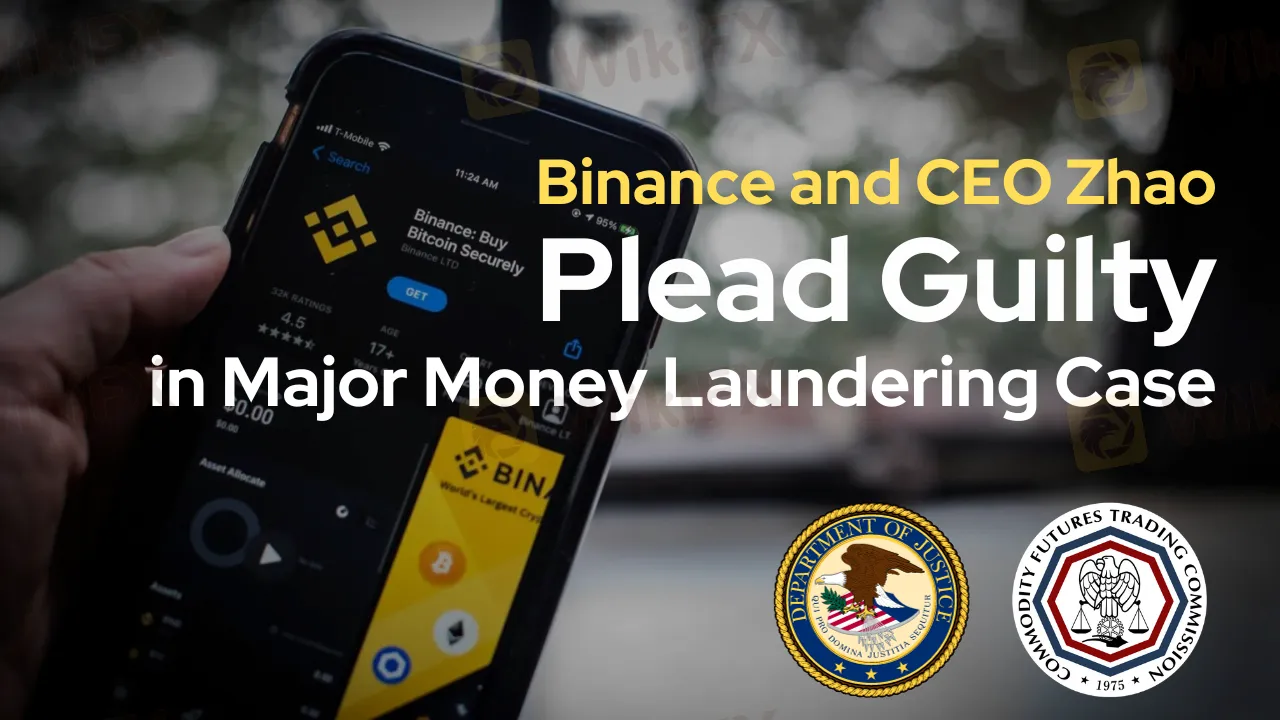简体中文
繁體中文
English
Pусский
日本語
ภาษาไทย
Tiếng Việt
Bahasa Indonesia
Español
हिन्दी
Filippiiniläinen
Français
Deutsch
Português
Türkçe
한국어
العربية
Binance and CEO Zhao Plead Guilty in Major Money Laundering Case
Abstract:Binance and CEO Changpeng Zhao plead guilty to money laundering and sanctions violations, facing over $4 billion in fines and legal repercussions.

Binance, the world's largest cryptocurrency exchange, and its billionaire founder, Changpeng Zhao, agreed to plead guilty to federal charges in a landmark legal step aimed at bringing regulatory order to the anarchic world of cryptocurrencies. This revelation is a watershed moment in the history of the crypto realm.
The settlement, reached via a coordinated effort by different federal agencies, requires Binance to pay more than $4 billion in penalties and other costs. Zhao, a prominent cryptocurrency player, will step down as CEO of the exchange he founded. In addition, he is liable for a $200 million penalty.
Related News:
Binance, the world's biggest cryptocurrency exchange, acknowledged offenses such as anti-money laundering violations, unauthorized money transfers, and sanctions violations.
According to US authorities, this is the most major business settlement including criminal charges against a senior executive.
Following an exhaustive investigation, investigators concluded that Binance permitted malicious individuals to execute transactions on its platform, resulting in crimes ranging from child sexual abuse and drug trafficking to supporting terrorist groups such as ISIS, Al Qaeda, and Hamas' Al-Qassam Brigades.
Zhao, who is worth more than $23 billion, pleaded guilty to failing to operate an effective anti-money laundering program.
The United States is hoping that Binance and Zhao's confessions, together with the recent conviction of FTX co-founder Sam Bankman-Fried, would dissuade illegal activity in the cryptocurrency business.

“Binance achieved its status as the top cryptocurrency exchange partly due to its criminal activities - it's now facing one of the heftiest corporate penalties in U.S. history,” said Merrick Garland, the U.S. attorney general.
Zhao faces up to ten years in jail, but his actual term is likely to be far shorter, with federal guidelines recommending a maximum of roughly 18 months. The penalty will be decided by a judge in the end.
Zhao will pay a $50 million fine under the plea bargain, as requested by prosecutors. According to the Commodity Futures Trading Commission, he will also pay $150 million in civil penalties. Binance must also return $1.35 billion in fraudulently obtained earnings and pay a $1.35 billion civil monetary penalty to the CFTC under the terms of the consent decree.
“Binance ignored its legal duties in the pursuit of profit,” Treasury Secretary Janet Yellen said. “Its intentional failures allowed the flow of funds to terrorists, cybercriminals, and child abusers through its platform.”

Binance's guilty plea is part of a broader settlement with the Justice Department, Treasury's Financial Crimes Enforcement Network (FinCEN), the Office of Foreign Asset Controls (OFAC), and the Commodity Futures Trading Commission. The Binance settlement was regarded by the Treasury as its biggest enforcement action to date.
“The Binance platform facilitated some truly atrocious acts - from terrorist financing to ransomware, child pornography, and various scams and frauds,” a senior Treasury official told reporters.
According to US investigators, Binance permitted over 100,000 illegal transactions and more than 1.5 million virtual currency exchanges that breached US sanctions, including those on Iran, Syria, and Cuba.
Following the news of the settlement, Zhao acknowledged his resignation as CEO in a statement on X (previously known as Twitter).
“It was a difficult decision to make emotionally.” “But I know it's the right decision,” Zhao said. “I made mistakes for which I must accept responsibility.” This is the greatest possible result for our community, Binance, and me.
Related News:
Richard Teng, previously Binance's global head of regional markets, will succeed Zhao.
“While Binance is not without flaws, it has always strived to protect its users since its inception as a small startup.” Binance has made considerable investments in security and compliance,“ the business stated in a statement on Tuesday. ”Binance grew rapidly around the world... [and] made some poor decisions along the way.“ Binance now has responsibility for the last chapter.”
What Binance Allegedly Did Wrong
On Tuesday, US authorities released criminal filings saying that, under Zhao's leadership, Binance facilitated transactions for clients conducting illegal mixing services and “laundered proceeds from darknet market transactions, hacks, ransomware, and scams.” Prosecutors argue that Binance's anti-money laundering processes were deficient.
Prosecutors claim that the alleged misbehavior brought Binance to the forefront of the cryptocurrency trading sector.
“Binance, partly due to this scheme and its prioritization of growth, market share, and profits over U.S. law compliance, became the world's largest cryptocurrency exchange,” the government said.

Binance has been charged with “knowingly failing” to register as a money service firm, deliberately violating the Bank Secrecy Act by failing to develop an effective anti-money laundering policy, and willfully causing breaches of US economic sanctions.
The allegations, filed in the United States District Court for the Western District of Washington, accused Binance of making a “deliberate and calculated effort to profit from the United States market without adhering to the required controls of U.S. laws.”
Prosecutors believe that the wrongdoing, which included some Binance officials, directors, employees, and agents, started in August 2017 and persisted until at least October 2022.
Garland mentioned a February 2019 communication from a compliance staffer stating that Binance was a refuge for drug money laundering as he discussed the federal government's investigation into Binance.
“By failing to comply with U.S. law, Binance made it easy for criminals to transfer their stolen funds and illicit proceeds on its exchanges,” Garland said in a statement.
U.S. Officials' Stance on Crypto Crime
Digital currency supporters say that the great majority of crypto transactions are legal and lawful. In the last five years, a specialist sector of organizations has formed to aid law enforcement in tracing digital transactions.
However, senior US authorities have made it quite clear that they would not tolerate unlawful crypto operations.
“Today's actions demonstrate that if you cater to U.S. customers, you must adhere to U.S. laws,” said Nicole Argentieri, acting assistant attorney general. “Financial institutions in the United States serve as gatekeepers for the safety and security of our financial system.” Binance was required to comply with anti-money laundering rules since it serves a significant number of US consumers.
Binance's legal problems mirror the bankruptcy of another cryptocurrency exchange, FTX, and the fraud conviction of its creator, Sam Bankman-Fried. These are the most visible instances of the increased attention lately taken by law enforcement and regulators to the relatively unregulated crypto industry.
However, Russian ransomware gangs and North Korean money launderers continue to see cryptocurrency as critical to their operations. They often employ public tools, sometimes known as “mixing services,” to mask their unlawful riches.
In August, the United States Justice Department announced federal charges against the co-founders of one such firm, Tornado Cash, for transferring $1 billion in cryptocurrencies to criminals. One of the Tornado Cash co-founders has pleaded not guilty, while the other is still on the loose.
Officials underlined their holistic, cross-government strategy to eradicate financial criminality via cryptocurrency.
“You've seen through our actions today and in previous cases that we will relentlessly use every available tool against those who exploit technologies for illegal purposes,” remarked Deputy Attorney General Lisa Monaco.
Monaco cited the Justice Department's formation of the National Cryptocurrency Enforcement Team as proof of the federal government's commitment, as well as how multiple government institutions coordinate on investigating crypto-related crimes.
Some think that additional action is required.
“Unfortunately, the resolution reached today is not exceptional. ”Until all prosecutors, regulators, and elected officials compel the industry to conform to the same legal standards as other entities in the financial industry, the lawlessness and criminal activities in crypto will persist and escalate, said Dennis Kelleher, co-founder, president, and CEO of Better Markets, in a statement.
About Binance
Binance, which was founded in 2017 by Zhao, a Canadian, has been accused by US market authorities of running an unlawful exchange for unregistered securities in the US. Binance was sued by the Securities and Exchange Commission in June, saying that it participated in “an extensive web of deception, conflicts of interest, lack of disclosure, and calculated evasion of the law.”
Binance has long claimed that it is not subject to US regulations since it does not have a physical presence in the US.
The SEC also accused Zhao and Binance of combining client funds and directing them to a company controlled by Zhao.
According to a Commodity Futures Trading Commission lawsuit, Zhao says the company's headquarters are wherever he is at any one moment, “reflecting a deliberate strategy to avoid regulation.” This agency accused Binance and Zhao of violating several derivatives trading rules in the United States, including reportedly directing “VIP” U.S. clients on how to avoid compliance procedures.
In June, a Binance spokeswoman said that the business takes the SEC's charges seriously but thinks they are “unjustified.”
“We respectfully disagree with the SEC's claims that Binance operated as an unregistered securities exchange or illegally offered and sold securities,” the business said in a statement. “Because of our size and global recognition, Binance finds itself an easy target in a U.S. regulatory tug-of-war.”

Disclaimer:
The views in this article only represent the author's personal views, and do not constitute investment advice on this platform. This platform does not guarantee the accuracy, completeness and timeliness of the information in the article, and will not be liable for any loss caused by the use of or reliance on the information in the article.
Read more

Vantage Markets Review 2025: Trusted Forex and CFD Trading Since 2009
Explore our 2025 Vantage Markets review! A trusted Sydney-based broker since 2009, offering forex, CFDs, low spreads, global regulation, and 24/7 support. Trade from $50!

IronFX vs Exness Review 2025: Comprehensive Broker Comparison
Explore an in-depth comparison between IronFX and Exness. Compare licensing, features, regulation, trading platforms, and customer service for smarter trading decisions.

eToro Review 2025: Top Trading Opportunities or Hidden Risks?
Is eToro a trustworthy broker or a scam in 2025? Explore its regulations, user reviews, and reputation to decide if it’s safe for trading forex, stocks, and crypto. Read now!

ASIC Urges Financial Licensees to Fix Register Errors Before 2026 Deadline
ASIC has warned AFS licensees to urgently correct errors on the Financial Advisers Register, with over 4,600 advisers still not meeting the 2026 qualification standard.
WikiFX Broker
Latest News
SkyLine Guide 2025 Malaysia: 100 Esteemed Judges Successfully Assembled
Vantage Markets Review 2025: Trusted Forex and CFD Trading Since 2009
Why STARTRADER Is Popular Among Traders?
A Guide to Intraday Forex Trading You Can't Miss Out
CONSOB Blocks Access to 13 Unauthorized Investment Websites
TradingPRO: A Closer Look at Its Licences
The world could be facing another ‘China shock,’ but it comes with a silver-lining
New SEBI Regulations on Intraday Trading
Everything You need to know about Barath Trade
IronFX Broker Review 2025: A Comprehensive Analysis of Trustworthiness and Performance
Currency Calculator




